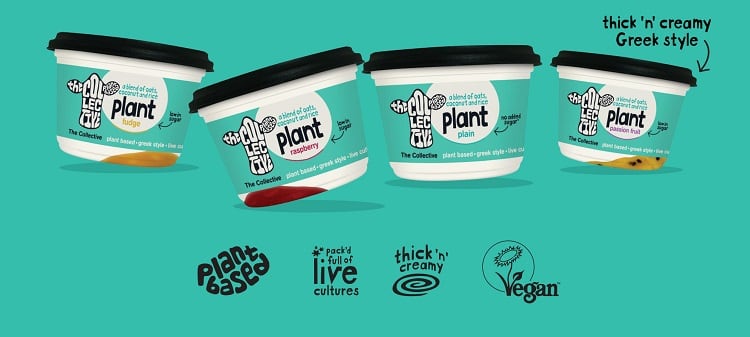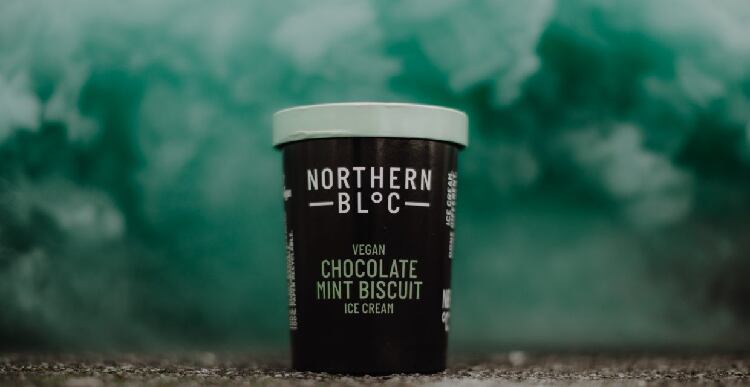The UK boasts an impressive dairy alternatives market. Plant-based milk, for example, is growing at an estimated CAGR of 13.8%. According to Grand View Research, the category is expected to be worth $705.3m by 2025.
Plant-based brands are making a name for themselves in the sector. Yet given the category’s strong growth potential, traditional dairy companies are also vying for a slice of the plant-based pie.
So how does a cheese, yoghurt, or ice cream player diversify into plant-based? FoodNavigator shares insights from three brands that have taken the leap.
Plant-based surge drives diversification
Cheese brand Applewood was the first dairy company in the UK to enter plant-based. The Norseland-owned brand, which has been on the market since 1965, is best-known for its smoky cheese offerings. Today, Applewood sells into retail and foodservice across 20 countries worldwide.
Just a few years ago, the brand observed a growing trend for plant-based food. Acknowledging the ‘real consumer need’ for ‘great tasting’ dairy-free options, Applewood jumped in headfirst, recalled Norseland Senior Brand Manager Lisa Harrison.
“It was quite a brave decision to do at a dairy company,” she told the recent Plant Based Summit hosted by start-up network Bread & Jam.
Applewood Vegan Smoky Cheese Alternative ‘tastes just as great’, ‘melts fantastically’, and is ‘very versatile’, she continued. Having secured its first listing in September 2019, Harrison said it has been a ‘huge success’.

Gourmet yoghurt company The Collective was also well established in dairy – with a presence in high-end yoghurt, children’s offerings, and kefir – before noticing ‘the big opportunity’ in plant-based.
The brand clocked the ‘big growing area’ of plant-based yoghurts around two years ago. According to 2019 Mintel data, one-third of UK consumers identify as flexitarian, which The Collective perceived as a “big opportunity for us to offer choice”, Innovation Brand Manager Ciaran Adam told delegates.
The Collective’s plant-based range, made from a blend of oats, coconut and rice, first hit the market in January this year. “It was a big strategic move for us,” recalled Adam, “transitioning from dairy to plant – and riding across the two of them.”
But ultimately, the decision came down to choice: “This is what this move is about, offering better choice for consumers.”

Moving from the fridge to the freezer, Leeds-based ice cream brand Northern Bloc first entered the grocery and out-of-home markets back in 2015. The initial idea behind its dairy range was to create a ‘chef’s style’ ice cream, but on a ‘semi-industrial level’, explained co-founder and Director Josh Lee.
“We try to replicate an ice cream that you would make at home, or how high-level chefs would make it in a kitchen – but day-in-day-out at our factory in Leeds.”
Eager to establish a ‘point of difference’ in what Lee described as a ‘very competitive’ category, Northern Bloc sought to add ‘something different’ to its bow. Predicting the vegan category’s growth potential, the ice cream maker turned its hand to plant-based.
Northern Bloc’s first plant-based ice cream alternative launched into retail and out-of-home in 2018, and on all counts, has ‘grown really quickly’.
Ensuring against dairy contamination
Cow’s milk allergy is one of the most common food allergies to affect babies and young children in the UK. Lactose intolerance, whereby the body is unable to digest a type of sugar mainly found in milk and dairy products, is thought to affect between one and two in every 10 people.
Understandably, ensuring against cross-contamination is a major concern for dairy operators moving into plant-based.
“We were very concerned against cross-contamination, because at the time there were a few sad stories in the press about dairy-free consumers [unknowingly eating] products that had dairy in them,” recounted Applewood’s Harrison.
One well-known example occurred in restaurant chain Byron, where in 2017, teenager Owen Carey – who had a dairy allergy – died after eating a chicken burger containing buttermilk.
Applewood developed its vegan offering with a third-party manufacturer, who manufactures the product off-site. “They have an allergen-free factory,” Harrison explained.

The Collective’s plant-based range was two-years in the making, and a large proportion of that time was dedicated to finding the ‘right’ manufacturer. Due to the company’s manufacturing process, that meant finding a factory that had expertise in yoghurt making, plant-based milk manufacture, and housed no trace of dairy ‘whatsoever’.
To create The Collective’s Plant range, a plant-based milk is developed from oats, coconut, and rice. That milk alternative is then transformed into a Greek-style yoghurt, which Adam described as ‘thick, creamy and tangy’.
Having spoken to approximately 50 manufacturers across Europe, The Collective eventually found one, with whom they jointly built a factory. Having a ‘completely segregated’ site was ‘really important’ to The Collective, he stressed. “Especially being a dairy brand with a cow-faced logo!”
How is the market responding?
So how are consumers responding to this shake up of traditional dairy company offerings?
For Leeds-based Northern Bloc, demand has been so high the business is considering going fully plant-based. “In our first year, [plant-based] made up 35% of our sales,” recalled the Northern Bloc Director. “Now in 2021, it will make up 75% of our sales.”
These days, Northern Bloc has dropped its dairy offerings in grocery, taking dairy out of that sales channel completely. In the out-of-home market, its plant-based ice cream alternatives are growing in market share, with some customers opting to solely list the vegan alternative, we were told.
Lee puts this down to the quality of the product. It delivers on taste and texture, he continued. “So it’s kind of a no brainer really – you can offer one product that ticks every box.”
If Lee had been asked this time last year whether Northern Bloc would consider exiting dairy completely, his response would have been a firm ‘no’. However now, as volumes in the out-of-home market catch up to that of dairy, he revealed a change of heart: “I think it makes sense to become solely plant-based.”
Over in Somerset, where Norseland is headquartered, Applewood’s Harrison suggested consumer uptake of its vegan offering has been significant. “This year we’re looking at about 10% [of sales for the plant-based range], which is huge considering we launched in late 2019.”
The Applewood Vegan Smoky Cheese Alternative is growing at around 70% year-on-year, which is well ahead of the vegan cheese market at around 46%.
It is unlikely that Applewood will be dropping its dairy range any time soon, however. “I’d like to get it to 50/50 [plant-based and dairy],” revealed Harrison. “But I do think there is a place for both dairy and plant-based options.”




